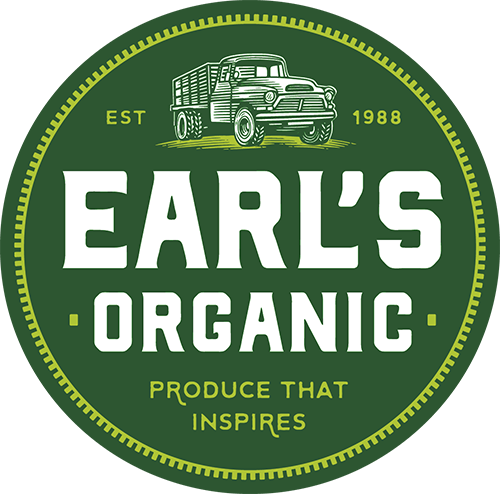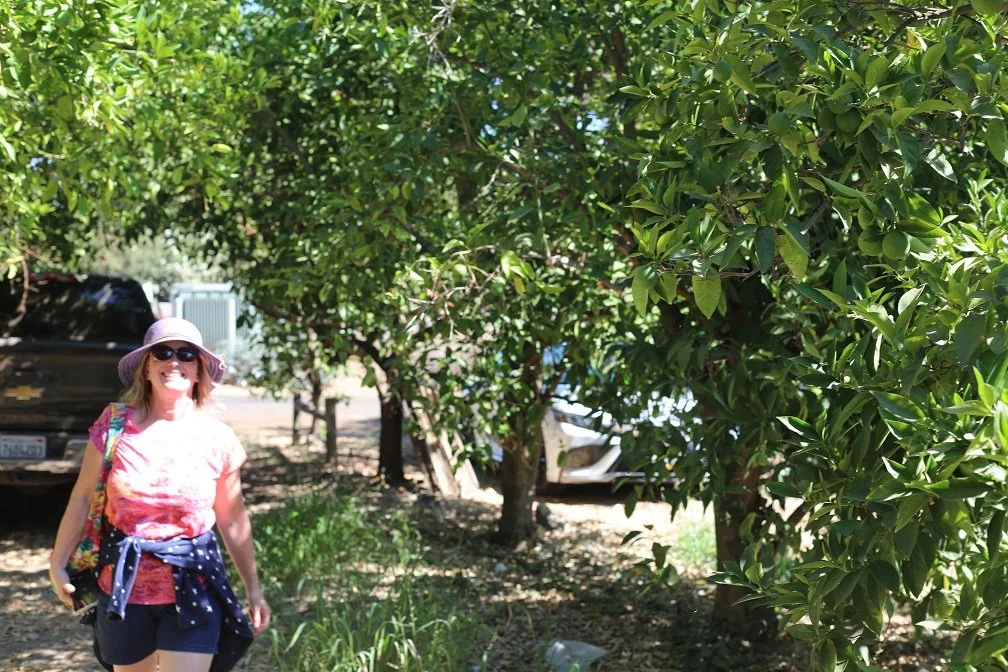FROG HOLLOW FARM TOUR SEPTEMBER 2022
Tucked away in Brentwood, just over forty miles from the Bay Area, Frog Hollow is an organic stronghold in the region. They’ve come to be a household name over the past 46 years, whose iconic boxes promise delicious, tree-ripened fruit with peak flavor. A short visit with Farmer Al and Rachel Sullivan gives an impression of effortlessness, but farming is rarely that – boasting 280+ acres in production, over 150 employees in the summer, and more than a hundred varieties of fruit, the farm is an extensive operation! And their dedication to continuous improvement is remarkable: trying new techniques for soil health, new fruit varieties for resilience and flavor, among other innovations.
Upon arrival Rachel and Farmer Al greeted us by their old pack shed, dark and nicely shaded for introductions. The many thousands of trees sprawl out from the central hub, and we walked through only a small portion of their land, starting with olives. The trees were huge: Al explained that their four varieties of Tuscan olives require a lot of work for harvest, but produce an unparalleled flavor profile when combined. Four hundred trees provide eight hundred gallons of oil in a year (about two gallons per tree). We passed by quince, jujubes, feijoas, and pomegranates, sidelined row after row of peaches, plums, and nectarines, while Rachel and Al spoke to us about their farm.
Neighboring fields
Most of Brentwood is heavily tilled and lies fallow for the majority of the year, after substantial corn and tomato harvests. Frog Hollow seeks to differentiate, producing fruit year-round and leaving the soil intact. But over a hundred varieties of fruit spells a dizzying array of quality standards: imagine the many shades of color, firmness, flavor, timing, and more that their workers must understand for a successful harvest. The fruit is graded five times before leaving the facility – and in the end, about 75% of the crop makes it to retail. The rest goes to their CSA program, to their own kitchen for processing, and finally to their massive six-acre compost operation, which is then spread back over the trees for soil fertility.
Sorted stone fruit, to be turned into compost
California’s drought has extensive effects on their operation, which is exactly why they’re intentional about sustainability practices. With only about nine inches of rain per year, they had to dig 800 feet to access ground water, but their primary aim is to keep moisture in the soil in the first place. They do this through heavy applications of compost and maintaining ground cover. This cover helps to keep carbon in the soil, contributing to cooling, aeration, and water storage, all while increasing biodiversity both above and below ground. “These critters are way weirder than Star Wars,” Al said, speaking about the bacteria and protozoa that work with fungi to break the molecular bonds in the soil for trees to access, in turn how we get our own nutrients.
The result is measurable: in Rachel’s six year’s with Farmer Al, the carbon content of their soil has gone up about 90%. With a background in soil biology, Rachel spoke at length about their compost production: they’ve fine-tuned their unique mix of wood pruning, composted fruit, coffee grounds, and manure, all layered like a lasagna, to produce a fungi-dominant blend that works well for perennial trees. The compost is spread before the winter, so the rains help to translocate the nutrients into the soil. A specialist comes through each week to take samples, run tests, as well as troubleshoot pest control techniques: in place of pesticides, we walked by pheromone disruptors hanging in trees (confusing pheromones leads to less reproduction).
Pheromone disruptor looks like a small bird house
After the short walk we arrived at the pack shed in full swing: the largest team at Frog Hollow, employees were grading, sorting, and delicately packing Warren Pears into boxes. The pears are all picked in the early Fall, as they need time off the tree for their skins to become thin and flavors to develop. The cooler was full of bins, which will be sorted and packed as needed. The grading machine was impressive – by taking a photo of every pear, it automatically drops each piece of fruit in the appropriate slot. The boxes are then packed by hand for their many sales avenues – the online store for country-wide shipping, direct retail, farmers markets, CSAs, and distributors like Earl’s.
We finished the tour by tasting fruit and baked goods from their kitchen, while discussing the future of farming in the region. Farmer Al explained that their location on the edge of the Sacramento Delta brings cooler nights than Fresno or Visalia, which allows the trees a bit of a break. Freeze events are rare (though very costly) and luckily, recent heat waves mostly only meant peaches ripening faster, employees taking more breaks, and a decline of pests. But they’re expecting more heat than anything else in the coming years, and less water. Which is exactly why they’re so dedicated to honing the growing techniques for both long-term conservation and effectiveness.
Farmer Al expressed that Frog Hollow transitioned to organic because he did not want to use poison on himself and his land – but as time went on his dedication became more complex, holding in mind the continuation of life on planet Earth. He is open and curious, while constantly thinking ahead and seeking improvement. Fortunately, they told us that they’re starting to see some positive developments even in the conventional world – for example, some of their neighbors are spreading compost and using cover crops after harvest. Al is all about fostering a community of folks who are similarly engaged, and we’re glad to be a part of it!











